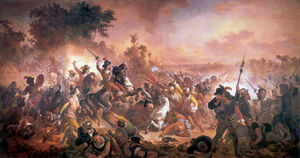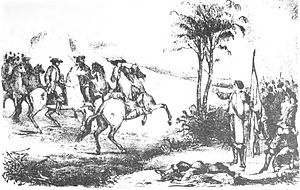| Battle of Guararapes | |||||||
|---|---|---|---|---|---|---|---|
| Part of Dutch-Portuguese War | |||||||
 | |||||||
| |||||||
| Belligerents | |||||||
|
|
| ||||||
| Commanders and leaders | |||||||
|
|
| ||||||
| Strength | |||||||
| 3,500[3] | 2,600[4] | ||||||
| Casualties and losses | |||||||
| 1,045 dead, wounded or captured[5] |
45 killed[6] 200 wounded[7] | ||||||
| |||||
The Second Battle of Guararapes was the second and decisive battle in a conflict called Pernambucana Insurrection, between Dutch and Portuguese forces in 1649 at Jaboatão dos Guararapes in the state of Pernambuco, ending the Dutch occupation of the Portuguese colony of Brazil.
History[]
Though the Dutch West India Company fielded a larger, better equipped force, they suffered morale problems as most of their army was made up of mercenaries from Europe (primarily Germany) who felt no real passion for the war in Brazil, as opposed to the Natives and Portuguese settlers who considered Brazil to be their home and were fighting for a patriotic cause. The Dutch force was also unused to fighting in the dense jungle and humid conditions of the country, wearing thick, brightly coloured European clothing and heavy metal armour which inhibited their dexterity. Contemporary accounts describe Dutch troops at the battle as "pale and sickly". The Dutch army at Guararapes were armed with pikes, cannon and an assortment of bladed weapons. It is thought by historians that the use of short blades by the Dutch was an attempt to imitate previously successful Portuguese weaponry and tactics.
The Portuguese force was made up of an assortment of natives, blacks and whites who knew, and had experience fighting in, the difficult Brazilian terrain. They would weaken Dutch troops with fusillades of musketfire from behind trees, and then charge with mêlée weapons.
The Dutch had expected the enemy to march down the well established coastal roads, and thus formed a lines of defence covering these roads. However, the Portuguese force used a series of minor trails to reach Pernambuco, appearing out of the wetlands to the west and Guararapes Hills (from which the battle derived its name) and flanking the Dutch. After several hours of fighting, the Dutch retreated northwards to Recife, leaving their artillery behind. Following the Dutch retreat, the Portuguese army marched into Pernambuco.
Important characters[]
- Henrique Dias - Son of slaves, he was the governador da gente preta (governor of the black people), ex-slaves from farms reached by the conflict.
- Filipe Camarão - Native Brazilian from the Potiguar tribe, leader of the forces from that tribe.

Battle of Guararapes.
- João Fernandes Vieira - Land owner from Funchal, Madeira, commanded one infantry terço.
- André Vidal de Negreiros - Commander of one infantry terço.
See also[]
References[]
- David Marley, Wars of the Americas: a chronology of armed conflict in the New World, 1492 to the present (1998) ISBN 978-0-87436-837-6
- Pita, Sebastião da Rocha, História da América Portuguesa, Ed. Itatiaia, 1976
Notes[]
- ↑ David Marley, p.133
- ↑ David Marley, Brincks army's disintegrates, the commander himself falling mortally wounded. p.133
- ↑ David Marley, Some 3,500 Dutch troops march out of Recife under Colonel Brinck (...) p.133
- ↑ David Marley, (...) confronting 2,600 Portuguese defenders under Governor Barreto dug in on the Guararapes Plain. p.133
- ↑ David Marley, Dutch losses total 1045 dead, wounded or captured (...) p.133
- ↑ David Marley, (...) 45 Portuguese killed and 200 wounded. p.133
- ↑ David Marley, p.133
| Wikimedia Commons has media related to Battle of Guararapes. |
The original article can be found at Second Battle of Guararapes and the edit history here.